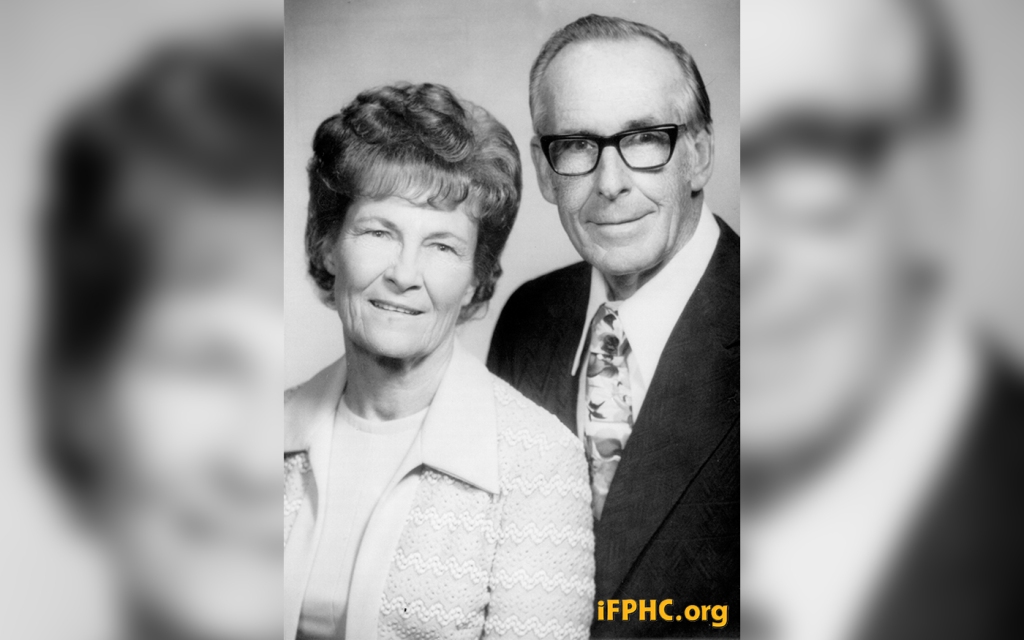John and Ella Franklin: Pioneer Assemblies of God Missionaries to Guatemala

This Week in AG History–April 11, 1942
By Ruthie Edgerly Oberg
Originally published on AG News, 11 April 2024
John L. Franklin (1910-1999) was orphaned shortly after birth by the death of his mother, and he spent the majority of his young life in an orphanage. Yet even as a young boy he felt that God had laid His hand on him for a greater work — that of missionary service.
While attending Southern California College (now Vanguard University) in the early 1930s, this call grew ever stronger. Franklin believed he needed more of God’s power if he were to attempt such an undertaking. He began to seek for the infilling of the Holy Spirit. After a time of prayer and fasting, he traveled to a mountain top overlooking the city of Pasadena. There he committed to give himself fully to God for the cities of the world. The next morning in the college chapel service, Franklin started to praise the Lord in his usual manner when he found himself speaking in a language he did not know. He was consumed with a burden of prayer for nation after nation.
Franklin soon became involved with evangelistic efforts on the Mexican border. From this experience he believed God was sending him to Guatemala in answer to the request from a small group of Pentecostal believers who were looking for help with discipleship and in reaching their neighbors. Assemblies of God missionaries Christopher and Inez Hines went to Guatemala in 1916 and stayed until 1925. No others had been sent in the interim to minister to their converts. Franklin and his new wife, Ella, responded to the call.
Bringing along their possessions — consisting of a mattress, an accordion, a typewriter, and a barrel of household items — they arrived in Jutiapa in April 1937. Securing a mule to ride out into the countryside, they located the five small congregations scattered among the mountains. These believers had prayed fervently for someone to come and lead them. They knew the Pentecostal message, but few had received the experience of the baptism in the Holy Spirit. The Franklins stayed with each group, in turn, sleeping in hammocks, bathing in mountain streams, drinking unsafe water, and eating many meals of beans and tortillas. They struggled with illness in growing accustomed to the new way of living, but were very happy to see God working in the lives of their new friends.
By early 1938, 300 people gathered together to form the first council of the Assemblies of God in Guatemala. John Franklin was named the first superintendent and Socorro Ramirez as secretary.
In 1941, Franklin opened a church in Guatemala City holding services every day for five months. The attendance was mostly children. On Good Friday of that year, God moved in a special way and seven people were filled with the Holy Spirit. This service sparked a revival, and the meeting room was always full after this. Soon a large evangelistic center was established in Guatemala City.
In a report in the April 11, 1942, Pentecostal Evangel, Franklin wrote of several healings and expressed thanks for the gift of a 1938 Chevrolet “in splendid condition and undoubtedly good for many years of service if Jesus tarries.” Even though the roads were primitive and, in many places, nonexistent, the car enabled them to carry abundant supplies and provisions. Franklin explained, “You cannot imagine how much easier it is than traveling by mule back.” (This was before the advent of the Assemblies of God Speed the Light program which purchases transportation for missionaries.)
Franklin also shared in the article the system of church planting they were using. “Each pastor is made to feel responsible for the villages surrounding the assembly of his charge … he is encouraged to evangelize and seek to bring other assemblies into being. In this effort he is assisted by his congregation which accompanies him on preaching trips to the new fields. Thus every pastor become an evangelist, and every member a pioneer worker.”
Church planting was not easy for the young Pentecostal movement in Guatemala. Franklin describes, “There is hardship entailed — hunger, fatigue, inconvenience of every kind. It means miles and miles of walking … intolerable heat at noonday and the chill of mountain heights because of scanty clothing or lack of sufficient covers at night. It means hours of torture because of insufferable plagues of mosquitoes or fleas. At times every effort to do good is repulsed and the works are reviled or threatened. Some have been stoned, others cruelly mistreated… it seems that a price must be paid for every victory gained — but how can we expect it otherwise? Our Lord paid a tremendous price for our salvation.” Franklin believed that there was no price too high for him or the believers he discipled to pay for the salvation of the people of Guatemala.
In 1977, 40 years after arriving in Guatemala, the Franklins retired from full-time ministry, returning to the United States. They made numerous short-term trips back to Guatemala to rejoice with the people who had become their family. From the five small groups of believers they found in 1937, God had blessed them with 600 established churches, 700 licensed ministers, and 55,000 Assemblies of God believers.
Read more of Franklin’s report, “A Harvest That Rewards the Sacrifice,” on pages 6-7 of the April 11, 1942, Pentecostal Evangel.
Also featured in this issue:
• “A Plea for Wholehearted Service,” by P.C. Nelson
• “Shut Out – the Fate of the Foolish Virgins,” by James Salter
• “Portions for Whom Nothing is Prepared,” by Margaret Ann Bass
And many more!
Click here to read this issue now.
Pentecostal Evangel archived editions courtesy of the Flower Pentecostal Heritage Center.
Do you have Pentecostal historical materials that should be preserved? Please consider depositing these materials at the Flower Pentecostal Heritage Center (FPHC). The FPHC, located in the Assemblies of God national offices, is the largest Pentecostal archive in the world. We would like to preserve and make your treasures accessible to those who write the history books.
Flower Pentecostal Heritage Center
1445 North Boonville Avenue
Springfield, Missouri 65802 USA
Phone: 417.862.1447 ext. 4400
Toll Free: 877.840.5200
Email: [email protected]
Website: https://ifphc.org/











Leave a Reply